Call it a charm of the board game hobby, but I find particular enjoyment when a game exists that you might find for a pittance at a yard sale one day and the next day for a great deal more online. The difference? One seller realizes what a gem they offer while the other might not.
Such is the case for Star Wars: Epic Duels, the 2002 Milton Bradley classic designed by Rob Daviau and Craig Van Ness, whose collective design credits have garnered more than a pittance in recent decades. Pandemic Legacy, anyone? Heroscape? For the Star Wars lover, these two designed a second title even more rare and highly sought after, The Queen’s Gambit, a title I’ve yet to see frivolously squandered from a table inside a suburban garage. Maybe one day.
For this review, however, let us draw our attention to Star Wars: Epic Duels, the basis and inspiration for Daviau’s more recent and widespread reimplementation, the Unmatched battle series, co-designed with Justin D. Jacobsen. The now-familiar card-driven mini-mini-figure skirmish system that celebrates literary and cinematic characters from all over the collective consciousness began a long time ago in a galaxy far, far away.
“Die, Jedi dogs”
Perhaps the first sentence uttered every time I teach Epic Duels sounds something like this: “These are not action figures.” Crafted during the prequel trilogy, Epic Duels includes characters from Episodes I, II, IV, V, and VI. Both main and sidekick characters are painted minis of a somewhat fragile, but endearing, constitution. Twenty-year-old light sabers are meant for admiration, not literal duels.
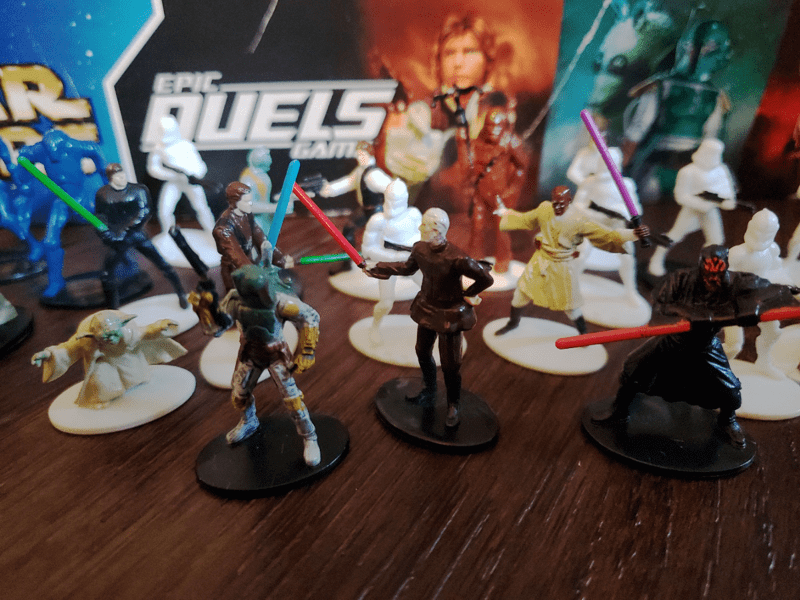
The four battle scenes in Epic Duels are laid out as grids, each with obstructions that offer hiding places for the useful-but-occasionally-annoying healing and gathering of a loaded hand of cards. Characters are assigned specific starting spaces, supporting sidekick characters are placed on adjacent spaces.
Though the title implies head-to-head battle, Epic Duels suggests a variety of configurations ranging from two players to three teams to controlling multiple character teams to massive free-for-all gameplay. Somehow the design team forgot to include one of my favorite setups: pushing two boards together and inviting twelve players in something that resembles the WWE’s classic Royal Rumble. This format is only recommended if you have all night and some of the next day, along with additional board games handy for folks to enjoy once they’ve been eliminated.
No matter the configuration, gameplay remains roughly the same. Each character team has a deck of thirty cards. Combat cards feature Attack and Defense values. Power Combat cards feature values plus some additional quirk. Special cards operate without Attack/Defense, but unleash quite useful game-breaking strengths. Each turn features rolling a die that will allow some form of movement for one or more characters followed by two card actions.
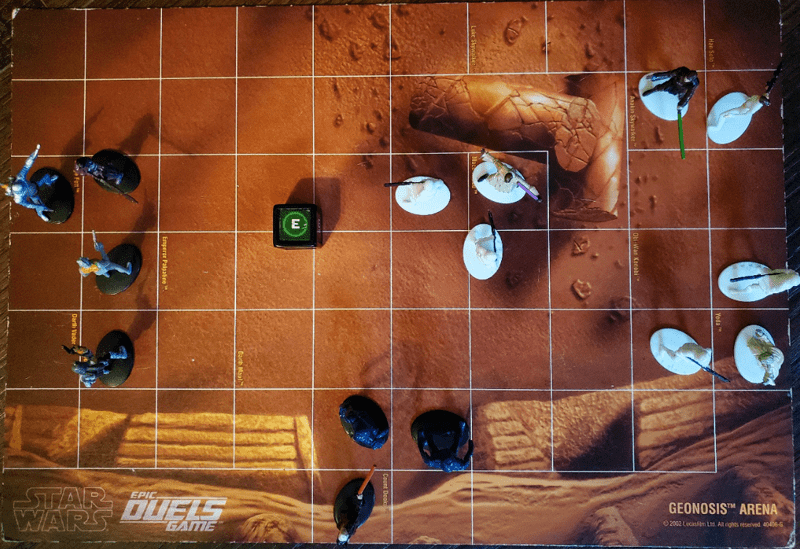
The name of the game is destroying opponents’ main characters. No matter the player count, the last fragile mini standing is the winner.
The rules are ridiculously simple. Melee fighters must be adjacent. Combatants with range weapons must have a clear line of sight. Players take damage in the amount equal to the difference between the attack and defense card values. The fun, as fellow Meeple Mountaineer Mark Iradian discerned with the Unmatched series, is likely in the love of the characters more than the pursuit of unique mechanics. Whether or not that’s a good thing is a matter of opinion.
“I’m quite beside myself”
Because of their connection, I would be remiss if I failed to point out the most apparent differences between grandaddy and offspring, which are now many.
The movement die has simply been replaced by a standard move for each character that can be supplemented by a discard boost. The Epic Duels die is more restrictive because it introduces the possibility that one or all characters might not be able to move, but the boost concept from Unmatched forces a precious discard, equally challenging!
The Epic Duels grid is more open at times to make a beeline toward an opposing character to spring a timely melee attack. I also appreciate the notion of springing out from behind an obstruction with a range attack, only to duck to safety again. The zone concept of the Unmatched board functions in much the same way, but without the strange obstructions.
While both games boast thirty-card decks, Epic Duels allows—in its pure two-player form—a second run through the reshuffled deck where Unmatched does not. Obviously this affects the game length, but perhaps the greater impact is in the propensity to hide behind a rock building an ideal hand, simply because the second shuffle grants more time. Here I believe Unmatched inclines the fighters towards action, because there is only so much daylight, so to speak.
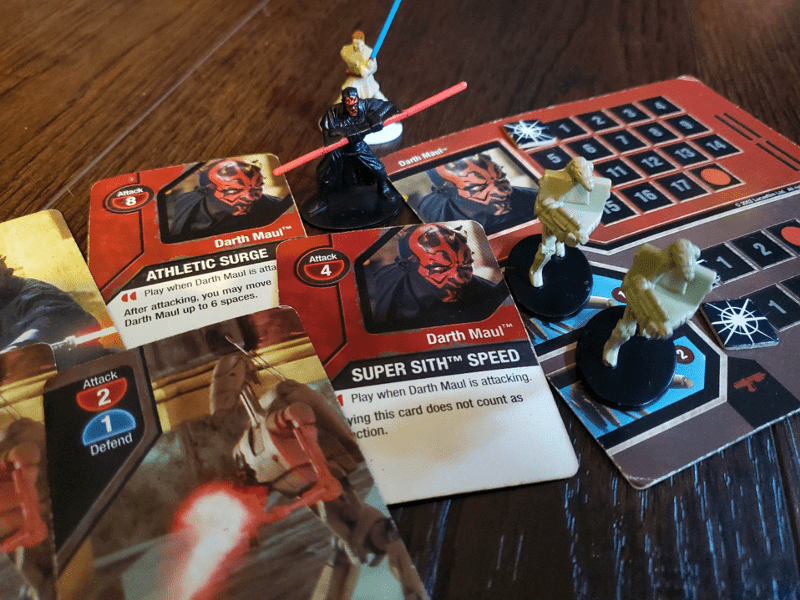
Along a similar vein, Epic Duels allows for healing via discard once the minor characters have been defeated. As a strategic thrust, this pushes players to use their minor characters as a front line, knowing that their demise will result in the ability to toss off cards for strength in the endgame.
The greatest drawback in either format is player elimination at the higher player counts. Twenty years ago the concept was far more normal, but not so much today. Newer entry-level skirmish games like Disney Sorcerer’s Arena have adopted the KO model and victory points for this reason. For anyone turned off by taking a seat on the sidelines, the team format provides a balm in allowing players to stay alive as long as either fighters or sidekicks remain in the game. But in the rumble, the rules offer no compensation.
“I’m programmed for etiquette, not destruction”
I first played a yard sale copy of Star Wars: Epic Duels quite a few years back, and I went home immediately to seek out a copy of my own. Unfortunately, I had to go the online route, so I paid almost 5,000% more (Don’t worry, 5,000% of $2 isn’t so terrible for a copy in great condition). I have since introduced it to others who have reacted much the same. These force wielders are endearing.
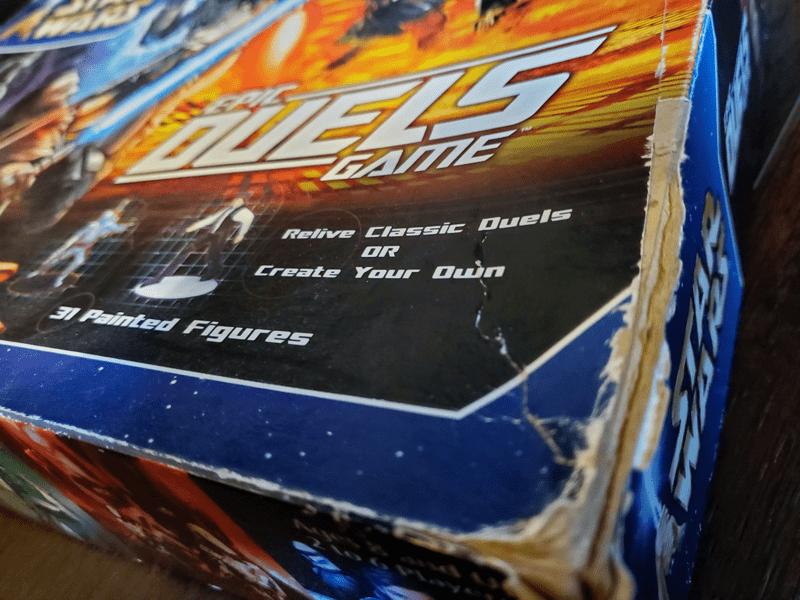
I hold Star Wars in something of a nostalgic light. I grew up on the original trilogy. I owned toys that might have provided a nice contribution to my retirement had I not destroyed them like an irresponsible seven-year-old who merely played with his toys. But come on, that old Hoth playset brought me its intended joy. I rushed to see the prequels, and I’ve been on a cooling streak ever since. I love what George Lucas created, but I’m no die hard.
I say this because I also believe the greatest strength of this dueling system is the prospect of playing with beloved characters. I adore Star Wars: Epic Duels because it was released in 2002. The original trilogy shines with the old school team ups of Boba Fett and Greedo, Luke and Leia, Han and Chewie, Vader, and the Emperor. The prequel highlights are also quite lively with young Obi Wan, Darth Maul, Count Dooku, and Jango Fett. Nostalgia is the greatest draw of the box. The mechanics are rudimentary, but they are rudimentary with Yoda and Mace Windu. I am one for whom those connections speak.
I love Unmatched for the same reason. When the character set doesn’t appeal, I don’t buy. My love is not rooted in the complex or ultra-innovative gameplay, it is rooted in how the very simple gameplay adapts slightly to embody a character I love. I feel the same about Marvel United. Others, I’m sure, feel the same about Heroscape. Some gamers aren’t swayed by their nostalgia. I am. I want to be Jekyll & Hyde because Robert Louis Stevenson penned one of my favorite novels. I want to be Sun Wukong because I want to wield Monkey’s stout cudgel with glee in honor of the legend. And, yes, I want to unleash a raging attack from Darth Maul, only to look my opponent in the eye and say, “This card does not count as an action,” knowing I have three more of those to play before I’m finished.
The minis are vintage fun. The arena boards are not all that thick. The mini cards are merely adequate. The cardboard damage markers and the player boards look like they were conceived two decades ago. The box “insert,” while designed to display the various decks for selection, is a paltry bit of collapsed cardboard at this point. In combination, it is a masterpiece. None of what Epic Duels has to offer would be acceptable by today’s standards, but it is simply lovely for its age.
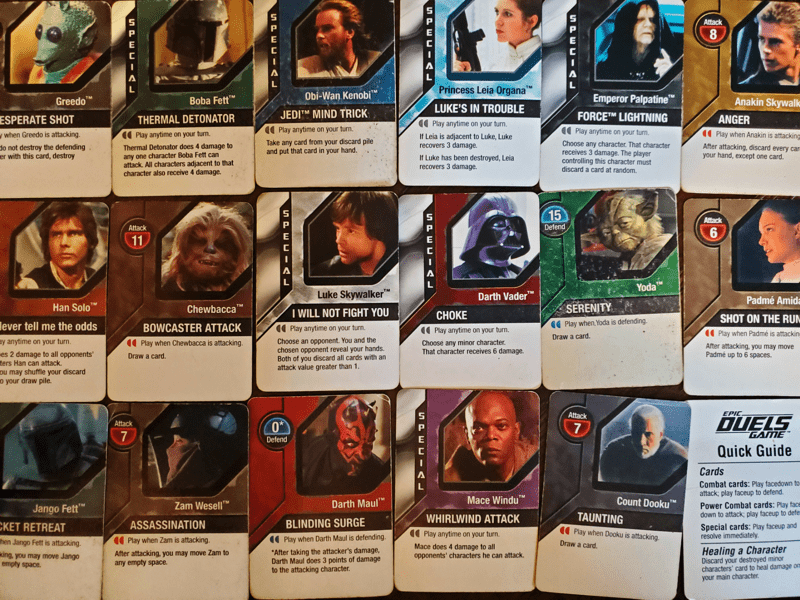
I’m pretty sure Obi Wan is overpowered. I’m pretty sure Han is criminally underpowered. There are few greater joys than jet-packing in with Boba Fett to unload a thermal detonator and fly away. Anakin and Padme are just as annoying as in the prequels. Luke’s “I will not fight you” card is strangely satisfying. Though their inclusion would make no sense, I feel like C-3PO and R2D2 are conspicuously absent. I might like to play as Lando or deal with a small army of Ewoks, but I’m happy they stopped where they did for the sake of my memories.
If you’re a Star Wars fan, you will not regret hunting down a copy of Epic Duels. I struggle to condone some of the online pricing, but I have no hesitation saying the game is a classic, breezy good time—a step into the Wayback that foreshadows our current day while holding up remarkably well under its own strength. I will be shocked if this particular catalog of characters never steps into the modern iteration, but I’m not sure I’d buy them if they did. Like my own appreciation, Epic Duels belongs to the past, and that’s where I want it to be when I visit and revisit for years to come.


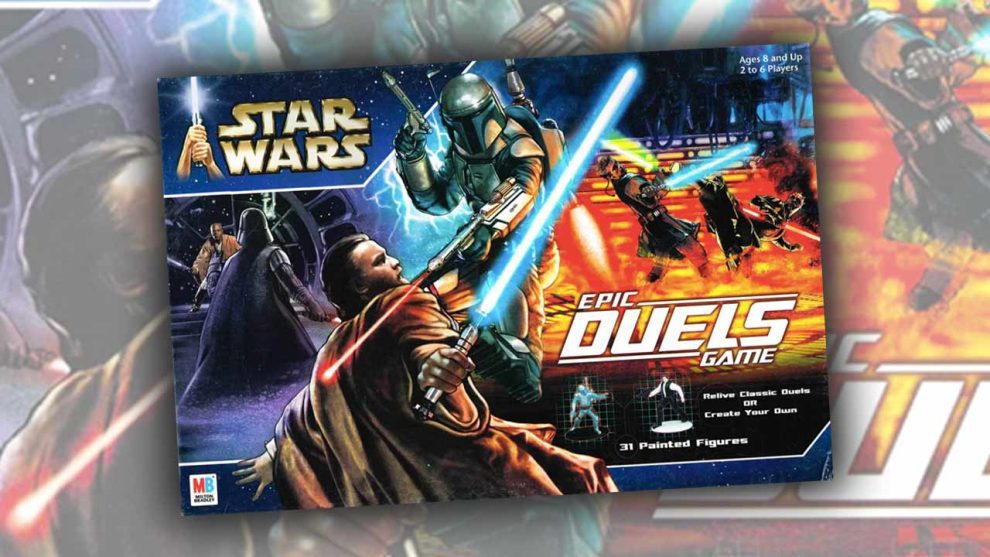


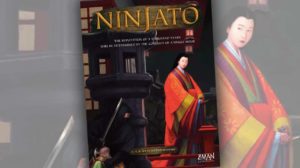
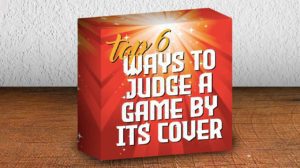





Add Comment